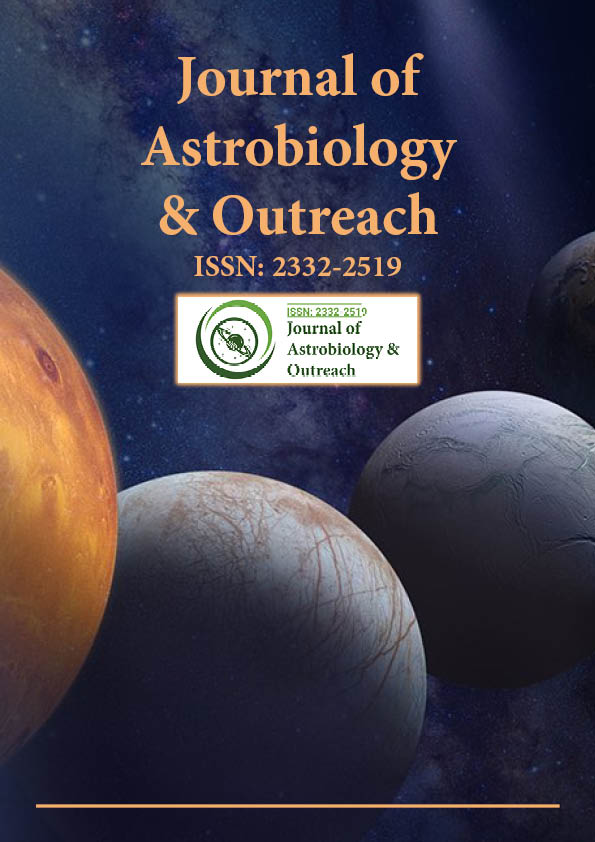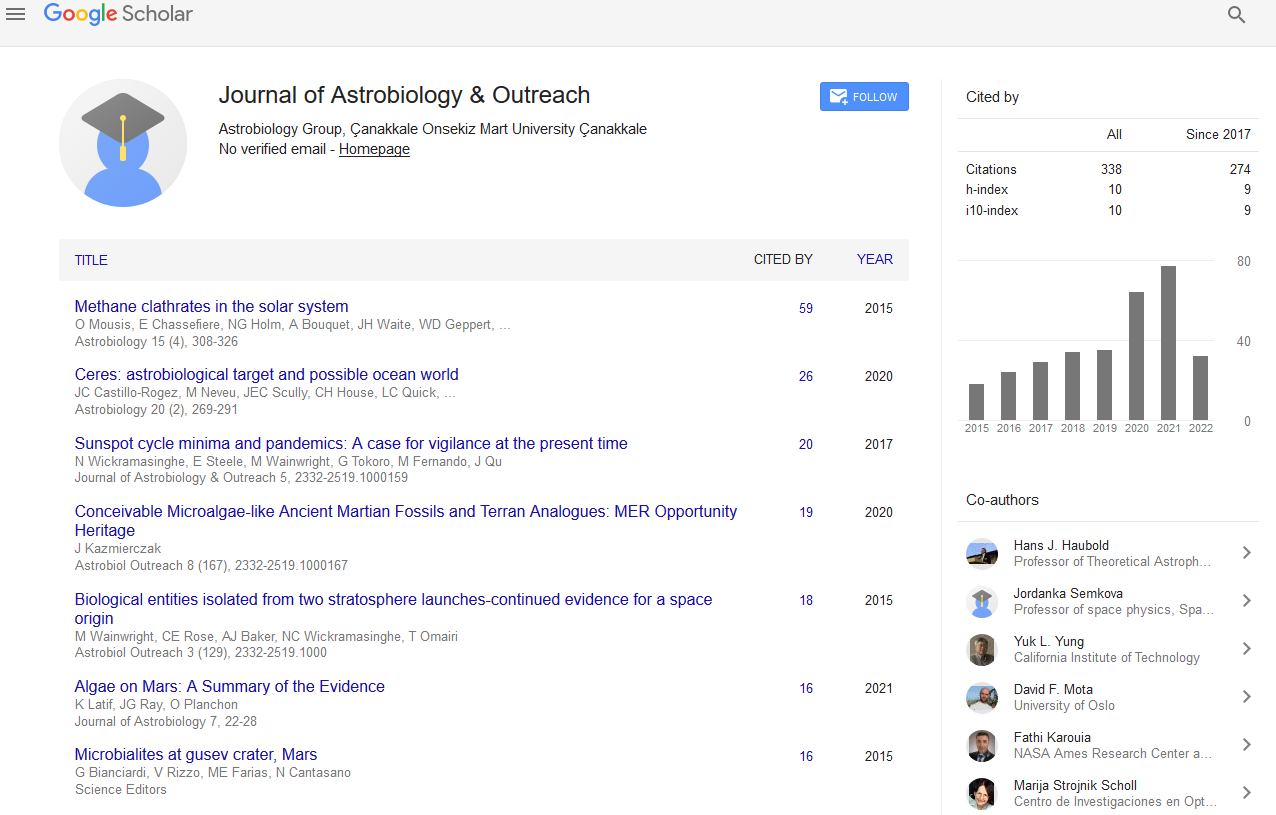Indexed In
- Open J Gate
- Academic Keys
- JournalTOCs
- RefSeek
- Hamdard University
- EBSCO A-Z
- OCLC- WorldCat
- Google Scholar
Useful Links
Share This Page
Journal Flyer

Open Access Journals
- Agri and Aquaculture
- Biochemistry
- Bioinformatics & Systems Biology
- Business & Management
- Chemistry
- Clinical Sciences
- Engineering
- Food & Nutrition
- General Science
- Genetics & Molecular Biology
- Immunology & Microbiology
- Medical Sciences
- Neuroscience & Psychology
- Nursing & Health Care
- Pharmaceutical Sciences
Perspective - (2023) Volume 11, Issue 4
Exploring Astroethics: Ethical Considerations in the Search for Extra-terrestrial Life
Allyson Brady*Received: 03-Jul-2023, Manuscript No. JAO-23-23360; Editor assigned: 05-Jul-2023, Pre QC No. JAO-23-23360 (PQ); Reviewed: 19-Jul-2023, QC No. JAO-23-23360; Revised: 26-Jul-2023, Manuscript No. JAO-23-23360 (R); Published: 03-Aug-2023, DOI: 10.35248/2332-2519.23.11.308
Description
As humanity advances in the field of astrobiology and space exploration, a new province of ethical questions emergesastroethics. Astroethics refers to the ethical considerations surrounding our search for and potential contact with extraterrestrial life forms. This evolving field raises profound questions about how we should approach the discovery of life beyond Earth, respecting not only our own moral compass but also the potential ethical concerns of extraterrestrial beings.
The search for extraterrestrial life
The exploration for extraterrestrial life has been a driving force in space exploration for decades. Scientists search for signs of microbial life on Mars, investigate the habitability of exoplanets, and send probes to moons in our solar system that may have subsurface oceans. Beyond our own solar system, the search for exoplanets in the habitable zone continues. However, with each new discovery, ethical questions arise.
One of the central ethical considerations in astroethics is the need to respect the potential existence of life elsewhere in the universe. As we explore celestial bodies, we must take precautions to avoid contaminating them with Earthly microorganisms. Contamination could not only interfere with our ability to detect native life but also endanger its existence.
Planetary protection
Planetary protection protocols are designed to mitigate contamination risks. These protocols vary depending on the target and mission. For instance, spacecraft sent to Mars must adhere to strict sterilization procedures to minimize the chance of introducing Earth life to the Red Planet. Astroethicists debate the extent of these protections and the balance between scientific exploration and the preservation of potential extraterrestrial life.
Initial exposure
The potential for first contact with extraterrestrial intelligent beings raises complex ethical questions. How should we approach contact with an alien civilization? What language or method of communication should be used? Ensuring peaceful and respectful interaction is important in astroethics. It is essential to consider the cultural and ethical differences that may exist between our species and an alien civilization.
Rights and responsibilities
Another facet of astroethics involves the rights and responsibilities that may come with the discovery of extraterrestrial life. Do alien life forms have rights akin to those of sentient beings on Earth? Should we consider our impact on their ecosystems? These questions challenge us to think beyond our own interests and consider the moral implications of our actions.
The impact on society
Astroethics extends beyond the scientific community and affects society as a whole. The announcement of extraterrestrial life could have profound social, religious, and psychological implications. Astroethicists are tasked with helping society navigate these potential changes and ensuring that the discovery of extraterrestrial life is met with thoughtful reflection. Astroethics is a rapid growing field that addresses the ethical dilemmas associated with the search for extraterrestrial life.
As we expand our exploration of the cosmos, it is important to balance our curiosity and scientific endeavors with a respect for potential life elsewhere, an awareness of our responsibilities in the universe, and a readiness for the ethical challenges that may arise in the event of contact with extraterrestrial beings. By engaging in meaningful discussions and developing ethical guidelines, we can approach the search for extraterrestrial life with the wisdom and ethical integrity it deserves. In doing so, we ensure that our journey into the cosmos is not only a scientific endeavor but also a moral and ethical one that respects the complexity and diversity of life in the universe.
Citation: Brady A (2023) Exploring Astroethics: Ethical Considerations in the Search for Extra-terrestrial Life. J Astrobiol Outreach. 11:308.
Copyright: © 2023 Brady A. This is an open-access article distributed under the terms of the Creative Commons Attribution License, which permits unrestricted use, distribution, and reproduction in any medium, provided the original author and source are credited.

